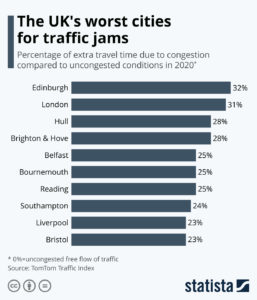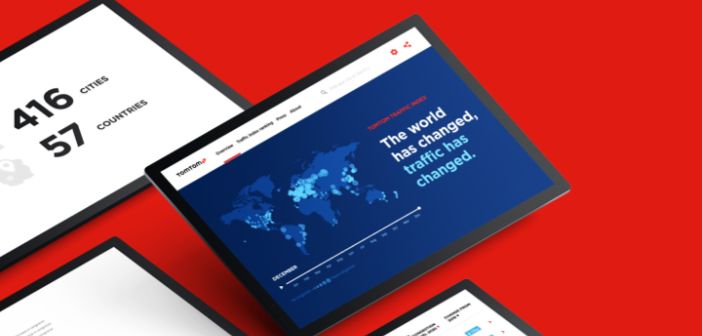Data released by location technology company TomTom shows global traffic levels fell across the world in 2020 but saw congestion spike on key dates as European cities experienced mass exoduses of people.
TomTom’s Annual Traffic Index highlighted that the days immediately preceding second national lockdowns were the most congested in London and Athens whilst in Paris traffic jams reached a record length.
On 29 October 2020 there was a 142% increase in congestion in Paris and on 04 November at 17:00 there was a 104% jump in London. Furthermore, on 06 November at 18:00 Athens saw a 123% increase in congestion.
The report, which covers the traffic situation in 2020 in over 400 cities in 57 countries, also highlighted which UK cities remain the most congested despite the coronavirus pandemic.
Whilst the figures were considerably lower than in 2019, Edinburgh remained at the top of the table with London a close second.
Commuters in the Scottish capital required 32% longer to get to their destination during ‘rush hour’, down 41% in 2019.
When compared to normal conditions, Londoners needed 31% more time to reach their destination in rush hour, while drivers in Hull required 28% more time.

TomTom said whilst the rankings had shifted very little from 2019, the big change was in how far congestion levels had fallen due to the global pandemic.
Out of the 416 cities included in the index, 387 saw a significant decrease, with an average 21% drop in congestion and a 28% average decrease during rush hours.
According to TomTom, this bucked a trend that had seen congestion increase by an average of 2-3% year-on-year.
Ralf-Peter Schäfer, TomTom’s vice president of traffic and travel, said: “Last year, we announced that global congestion levels in 2019 had increased for the ninth consecutive Traffic Index.
“In 2020, we saw a vastly different picture. From lockdowns to closed borders, people movement changed – and it changed very fast.”
Schäfer added thatTomTom didn’t expect roads to remain uncongested unless there was a concerted change in driver behaviour supported by police makers.
“Although traffic congestion was down in 2020, it’s not going to become a trend unless we take action,” he said. “We might even see traffic levels shoot up again as people get back to work and back into old routines.
“That’s why now is the time that city planners, policy makers, employers – and drivers – must take stock of what they will do to make the roads less congested in the future.”





